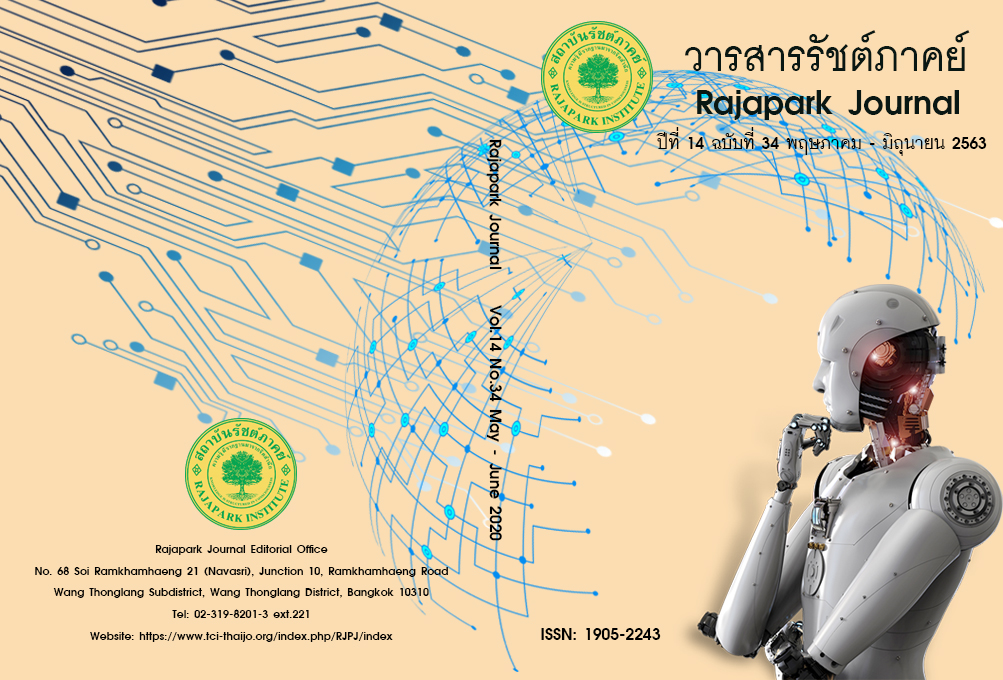The impact of technology development on employee performance
Main Article Content
Abstract
The objective of this study is to 1. Study the technological factors that affect bank employees' operations. 2. Study the personnel factors that affect the bank employees' operations. 3. Study the bank employees' performance. The population used in the research is the bank practitioners in both government sectors. And the private sector in Bangkok. The sample group selected 400 purposive sampling samples as survey research. There are tools used in this research, including questionnaires and data analysis. By using descriptive statistical tools Pearson's product-moment correlation coefficient and multiple regression analysis at the statistical significance level of 0.05. The results of the research showed that various organizations must accept technology. And the worker must be motivated to work including knowledgeability and skill which is clarity in the role and acceptance of the role. Given the opportunity and progress in the operation, it will make the operation efficient and effective. Enabling the organization to achieve its goals for efficient performance the results showed that factors affecting the efficiency of the work of the operator must include the quality of work, quantity of work, time spent and worthwhile use of resources for hypothesis testing found that perceived benefits of using technology and perceived ease of use and work motivation, knowledge, ability, and skills for clarity in roles. And role acceptance and job progress are related to effective performance which can create predictions the effective performance is as follows.
EP (Effective performance) = 4.017 + 0.044 (PU) +0.004 (PE) +0.261 (MW) +0.291 (KAS) +0.133 (RR) +0.201 (OO)
Article Details
Views and opinions appearing in the Journal it is the responsibility of the author of the article, and does not constitute the view and responsibility of the editorial team.
References
Chau, P.Y.K. and Lai, V.S.K. (2003). An empirical investigation of the determinants of user
acceptance of internet banking. Journal of Organizational Computing and Electronic
Commerce. 13(2), 123-145.
Cheng, T.C.E., Lam, D.Y.C., & Yeung, A.C.L. (2006) Adoption of Internet Banking: An Empirical
Study in Hong Kong. Decision Support Systems, 42(3), 1558-1572.
Davis, F. D., Bagozzi, R. P., & Warshaw, P. R. (1989). User acceptance of computer technology: A
Comparison of two theoretical models. Management Science, 35(8), 982–1003.
Davis, F. D., Bagozzi, R. P., & Warshaw, P. R. (1992). Extrinsic and Intrinsic Motivation to Use
Computers in the Workplace. Journal of Applied Social Psychology, 22(14), 1111-1132.
GSB RESEARCH. (September, 2017). Digital banking, Thailand competes to support cashless
society (Part 1), pp.1-4. Retrieved from https://www.gsb.or.th/getattachment/851ce005-1e0f-46a9- a39c-12179640d34d/12hotissue_digital_banking_detail.aspx)
Heeks, R. (2001). Building e-Governance for Development: A Framework for National and
Donor Action (February 18, 2001). iGovernment Working Paper no. 12. Retrieved from
https://ssrn.com/abstract=3540057 or http://dx.doi.org/10.2139/ssrn.3540057
Herbert, A. S. (1960). Administrative Behavior. New York: MC Milan.
Khamlaleang, S. (2001). The efficiency of Air Technician’s operation: case study of a Naval
Firearm Division. Master of Arts Thesis, Faculty of Political Science, Graduate School of
Ramkhamhaeng University.
Mathieson, K. (1991). Predicting User Intentions: Comparing the Technology Acceptance Model
with the Theory of Planned Behavior. Information Systems Research, 2(3), 173-191.
Nurittamont, W. (2017). Understanding the Role of Technology acceptance influence on internet
banking intention: An empirical study in consumer of commercial bank. International Journal
of Applied Computer Technology and Information Systems, 6(2), 28-33.
Peterson, E., & Plowman. E. G. (1993). Business Organization and Management. Homewood, Ill.:
Richard D. Irwin.
Porter, Lyman W. & Lawler, Edward E. III. (1968). Managerial attitudes and performance.
Homewood, Ill., R.D. Irwin.


